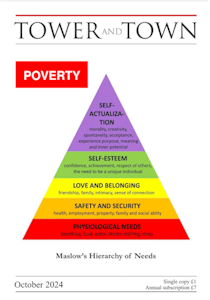

Tower and Town, October 2024 (view the full edition) (view the full edition)Breaking The CyclePoverty has deep and pervasive effects on families, influencing nearly every aspect of their lives. From access to basic necessities to emotional and social well-being, living in poverty presents constant challenges that shape the lives of both parents and children. This chronic stress can strain relationships, affect health, hinder education, and create a cycle that is difficult to escape. Economic Stress and Parental Well-being At its core, poverty creates relentless financial stress. Parents in low-income households are often forced to make impossible choices between basic needs-rent, food, healthcare, and utilities. The constant juggling of bills and resources can lead to heightened anxiety, depression, and emotional exhaustion in adults. These mental health challenges often affect how parents interact with their children and their ability to maintain a stable home environment. When parents are overwhelmed by financial pressure, they may struggle to provide the emotional support their children need, leading to tension and weakened family bonds. In addition to mental health struggles, parents in impoverished families often work multiple jobs or irregular hours, leaving them with little time to spend with their children. This lack of time can weaken the parent-child relationship, and the stress of long hours without adequate rest can lead to burnout. The inability to balance work and family life affects the quality of caregiving and can result in emotional distance within the household. Impact on Children's Education and Development Children growing up in poverty face significant educational disadvantages. Limited access to early childhood education, insufficient resources like books, internet connectivity, and quiet study spaces all create barriers to academic success. Schools in low-income areas are often underfunded, leading to larger class sizes, outdated materials, and fewer extracurricular opportunities. This lack of resources can hinder cognitive and social development, placing children at a disadvantage from an early age. The stress of living in poverty also affects children's ability to focus on their education. Hunger, unstable housing, and witnessing parental stress can lead to emotional distress, making it difficult for children to engage fully in learning. Over time, this can result in lower academic performance, increased absenteeism, and a greater likelihood of dropping out of school. These challenges reduce future earning potential, contributing to the cycle of poverty. Health and Nutrition Healthcare is another critical area affected by poverty. Families living in poverty are less likely to have access to preventative care, meaning minor health issues can go untreated and become chronic. They may also face difficulties affording medication or insurance, further compounding health problems. Poor living conditions, such as overcrowded housing or exposure to environmental hazards, can lead to respiratory issues, infections, or other health problems that are difficult to manage without proper care. Nutrition is often compromised as well, with families unable to afford healthy food. Access to fresh fruits, vegetables, and whole grains may be limited due to cost or availability, leading to diets high in processed foods that are calorie-dense but nutrient-poor. Malnutrition can have lasting effects on children's physical and cognitive development, and poor health overall contributes to increased absenteeism from school or work. Social Isolation and Emotional Effects Beyond the tangible effects on health and education, poverty often leads to social isolation. Families may feel excluded from community activities or school events due to the inability to afford participation fees or supplies. Children in poverty may experience bullying or feel ashamed of their circumstances, leading to low self-esteem and emotional distress. For parents, the inability to provide for their children as they would like can result in feelings of inadequacy and guilt. This emotional strain may affect marital or partner relationships, contributing to conflict or even separation. The lack of a strong support network exacerbates the challenges of poverty, making it harder to break free from its grip. Breaking the Cycle of Poverty The effects of poverty on families are profound, impacting every aspect of their lives, from health and education to relationships and emotional well-being. Poverty often creates a cycle that is difficult to break, as the challenges faced by one generation can pass down to the next. Effective interventions, such as access to quality education, affordable healthcare, and social support services, are critical in helping families break free from the cycle of poverty and improve their overall quality of life. Addressing poverty requires a multifaceted approach that supports both parents and children, giving them the tools they need to thrive despite financial hardship. Kym-Marie Cleasby |